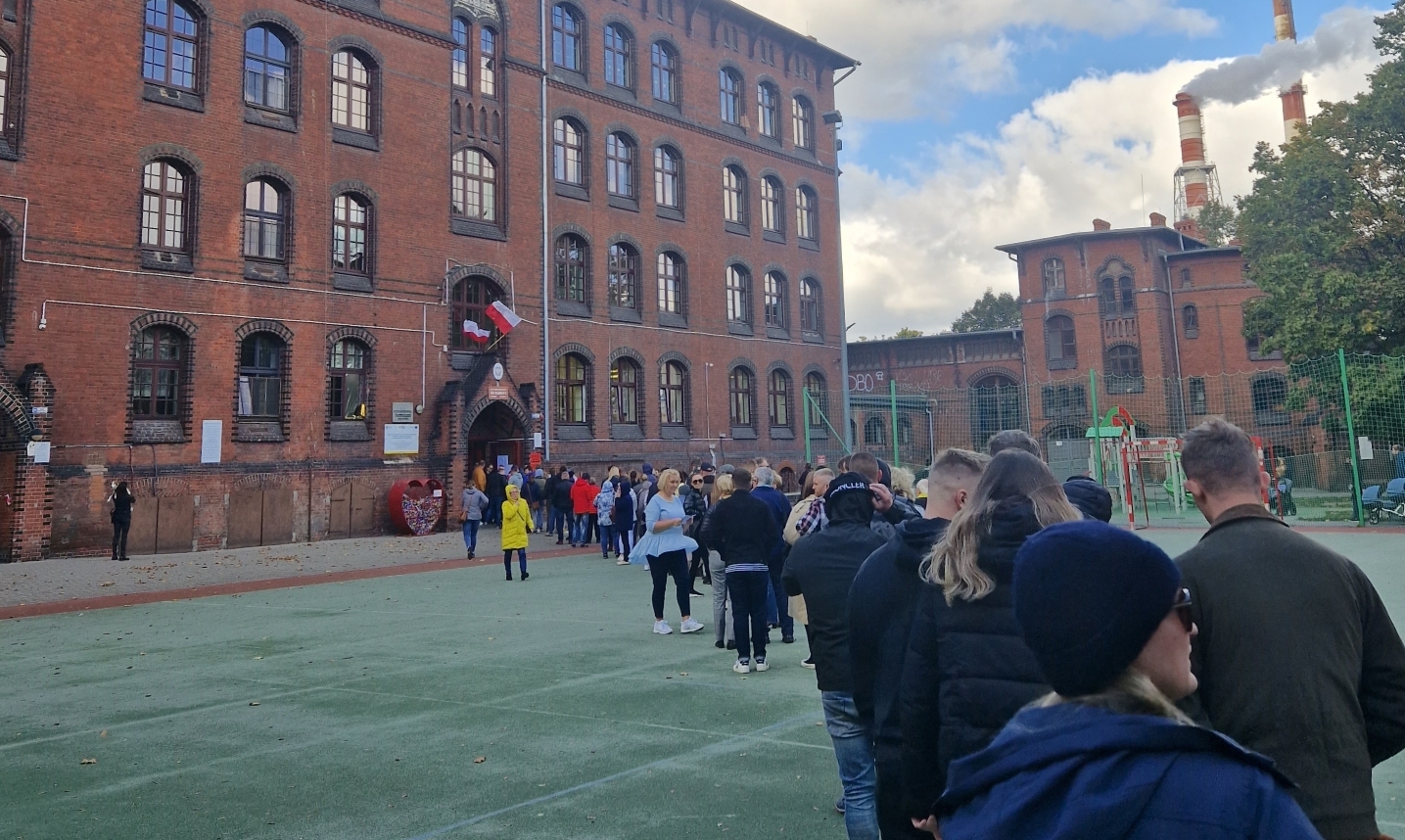Wind of change
Despite another win for Law and Justice, the three voting blocks of the democratic opposition are most likely to form a coalition government led by Donald Tusk.
October 17, 2023 -
Daniel Gleichgewicht
-
Articles and CommentaryHot Topics

Long line towards the polling station at primary school no. 58 in central Wrocław. Photo: Daniel Gleichgewicht
On October 15th, Polish citizens in Poland and around the world went out to vote in the parliamentary elections in record numbers. The turnout was at a staggering 74.4 per cent, almost 12 per cent higher than the previous record set in the first parliamentary election in 1989. The high levels of participation is a testament to how democracy is becoming entrenched in the former Eastern Block. The mobilisation was particularly high among women and younger voters. The geographical divides from the previous contests remains in place with the east of the country voting for Law and Justice (Prawo i Sprawiedliwość) – 35.4 per cent, and the west supporting the Civic Coalition (Koalicja Obywatelska) – 30.7 per cent. The same is true with regards to the contrast between urban voters and those of the countryside. It was in the cities the Third Way (Trzecia Droga) – 14.4 per cent, and New Left (Nowa Lewica) – 8.6 per cent, linked up with their voter base. The final party to enter the Sejm was the Confederacy (Konfederacja) with 7.2 per cent. It received a poor result following their optimistic polling earlier in the campaign. The results to the Senate, the upper chamber of the Polish parliament, pointed to a resounding victory for the Senate pact bringing together candidates from the Civic Coalition, Third Way and New Left. All in all they have received 66 of the 100 mandates.
Poland is exiting a particularly feisty election campaign that took place in the shadow of the war in Ukraine, the overall economic situation in the country and topics ranging from migration to women’s rights. Although Law and Justice used the state apparatus and public media to boost their message, it was the positive campaign of the democratic opposition that in the end proved to be more successful. Another factor that drove opposition voters to the polls was that many were simply fed up with the ruling party’s antics. Despite the flowers, chants and Polish flags, the mood at the election night at the PiS headquarters seemed sombre. Its leader Jarosław Kaczyńśki declared that “this is a great success of our party and our project for Poland” and that “we will not allow Poland to be betrayed!”. In another corner of Warsaw the leader of the Civic Coalition Donald Tusk told his followers that “never have I been so happy for this so-called second place. Poland won, democracy won, we have removed them from power!”. The former president of the European Council was fully aware of the fact that such a feat would not have been possible without the solid results of the Third Way and New Left. It will be together with the leaders of those parties he will now sit down to discuss how a new government will look like.
Much is now in the hands of President Andrzej Duda, who could use his prerogatives hailing from the constitution to either slow down or speed up the transition of power. It is difficult to predict how the president will behave in the coming months and to what degree he will be doing Kaczyński’s bidding. Conflicts between him and the incoming coalition are likely to revolve around the military and implementation of foreign policy, where Duda has already sparred with politicians from his own camp before. Tusk and his allies will surely try to avoid any delays and return parliamentarism to Poland. Though some of the knots tied in the judiciary by Law and Justice and their ally, Minister of Justice Zbigniew Ziobro, will be hard to untie, everything points to a swift release of the significant funds from the EU COVID recovery plan earmarked for Poland.
Many European capitals watched the unfolding events in Poland with anticipation. Berlin, which was frequently attacked by the ruling party during the campaign, will surely release a collective sigh and hope for a return of normality in its relations with Warsaw. The same can be said for Brussels, Washington and Paris which will welcome the decision of the Polish people. The result will also mean much with regards to the east. Ukraine might now look towards Warsaw rather than Berlin knowing it will have one of its most steadfast advocates for their European integration in the prime minister’s office. The regional dimension will be further affected with the chasm forming in the Visegrad group. The Czechs will be happy to see Poland aligning closer with their interests, while the Hungarians might have gained Slovakia, but lost Poland.
The Polish voters still made Law and Justice the largest party. After 8 years in power it is quite the feat to manage to achieve over a third of the vote. This means that the polarisation that deepened in the country over the previous decade is unlikely to halt. The confrontational language seen in the campaign will continue, but hopes are it will be tuned down at the public broadcaster which for years has been used to sow divisions. The result of the Third Way and the long lines at the elections are evidence that Poles have become tired of this endless in-fighting. During discussions bemoaning the long wait one could overhear that “this wait is nothing when you have waited eight full years”.
Daniel Gleichgewicht is an editor with New Eastern Europe.
Please support New Eastern Europe's crowdfunding campaign. Donate by clicking on the button below.

































